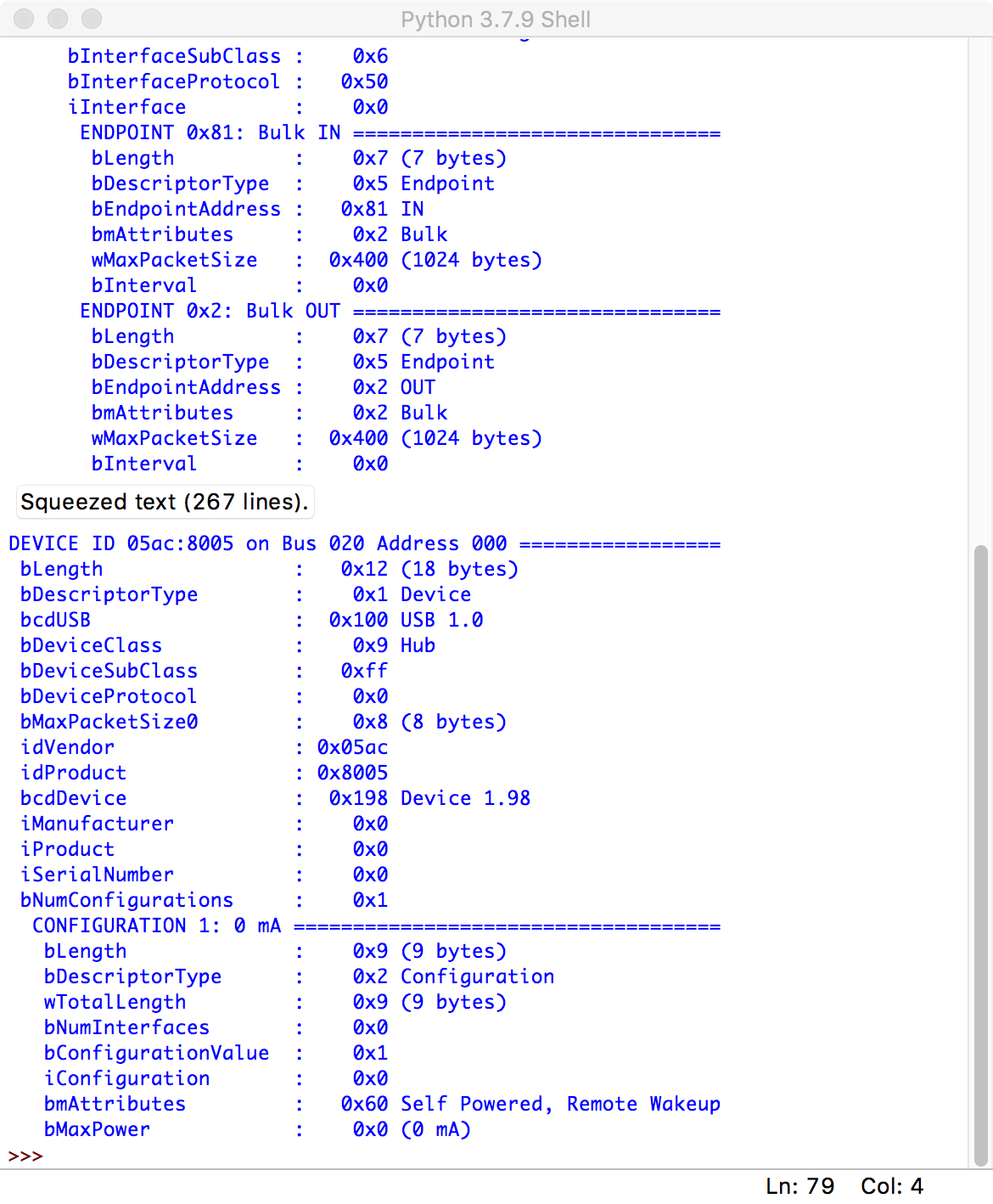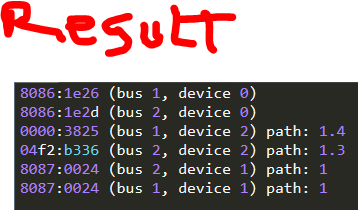windows下的PyUSB故障
windows下的PyUSB故障
提问于 2020-09-28 15:25:13
Pyusb在我的电脑上工作不正确。在这个论坛上没有任何关于我的问题的话题。详情如下。我试图运行一个简单的脚本来显示USB设备的信息:
import usb.core
import usb.util
for device in usb.core.find(find_all=True):
print(device)在此之后,我得到两个错误:usb.core.USBError: Errno 2实体未找到和NotImplementedError:未支持或未在此平台上实现的操作
日志
DEVICE ID 8087:8008 on Bus 001 Address 003 =================
bLength : 0x12 (18 bytes)
bDescriptorType : 0x1 Device
bcdUSB : 0x200 USB 2.0
bDeviceClass : 0x9 Hub
bDeviceSubClass : 0x0
bDeviceProtocol : 0x1
bMaxPacketSize0 : 0x40 (64 bytes)
idVendor : 0x8087
idProduct : 0x8008
bcdDevice : 0x5 Device 0.05
iManufacturer : 0x0
iProduct : 0x0
iSerialNumber : 0x0
bNumConfigurations : 0x1
CONFIGURATION 1: 0 mA ====================================
bLength : 0x9 (9 bytes)
bDescriptorType : 0x2 Configuration
wTotalLength : 0x19 (25 bytes)
bNumInterfaces : 0x1
bConfigurationValue : 0x1
iConfiguration : 0x0
bmAttributes : 0xe0 Self Powered, Remote Wakeup
bMaxPower : 0x0 (0 mA)
INTERFACE 0: Hub =======================================
bLength : 0x9 (9 bytes)
bDescriptorType : 0x4 Interface
bInterfaceNumber : 0x0
bAlternateSetting : 0x0
bNumEndpoints : 0x1
bInterfaceClass : 0x9 Hub
bInterfaceSubClass : 0x0
bInterfaceProtocol : 0x0
iInterface : 0x0
ENDPOINT 0x81: Interrupt IN ==========================
bLength : 0x7 (7 bytes)
bDescriptorType : 0x5 Endpoint
bEndpointAddress : 0x81 IN
bmAttributes : 0x3 Interrupt
wMaxPacketSize : 0x1 (1 bytes)
bInterval : 0xc
DEVICE ID 1c4f:0026 on Bus 003 Address 001 =================
bLength : 0x12 (18 bytes)
bDescriptorType : 0x1 Device
bcdUSB : 0x110 USB 1.1
bDeviceClass : 0x0 Specified at interface
bDeviceSubClass : 0x0
bDeviceProtocol : 0x0
bMaxPacketSize0 : 0x8 (8 bytes)
idVendor : 0x1c4f
idProduct : 0x0026
bcdDevice : 0x110 Device 1.1
iManufacturer : 0x1 Error Accessing String
iProduct : 0x2 Error Accessing String
iSerialNumber : 0x0
bNumConfigurations : 0x1
CONFIGURATION 1: 98 mA ===================================
bLength : 0x9 (9 bytes)
bDescriptorType : 0x2 Configuration
wTotalLength : 0x3b (59 bytes)
bNumInterfaces : 0x2
bConfigurationValue : 0x1
iConfiguration : 0x0
bmAttributes : 0xa0 Bus Powered, Remote Wakeup
bMaxPower : 0x31 (98 mA)
INTERFACE 0: Human Interface Device ====================
bLength : 0x9 (9 bytes)
bDescriptorType : 0x4 Interface
bInterfaceNumber : 0x0
bAlternateSetting : 0x0
bNumEndpoints : 0x1
bInterfaceClass : 0x3 Human Interface Device
bInterfaceSubClass : 0x1
bInterfaceProtocol : 0x1
iInterface : 0x0
ENDPOINT 0x81: Interrupt IN ==========================
bLength : 0x7 (7 bytes)
bDescriptorType : 0x5 Endpoint
bEndpointAddress : 0x81 IN
bmAttributes : 0x3 Interrupt
wMaxPacketSize : 0x8 (8 bytes)
bInterval : 0xa
INTERFACE 1: Human Interface Device ====================
bLength : 0x9 (9 bytes)
bDescriptorType : 0x4 Interface
bInterfaceNumber : 0x1
bAlternateSetting : 0x0
bNumEndpoints : 0x1
bInterfaceClass : 0x3 Human Interface Device
bInterfaceSubClass : 0x0
bInterfaceProtocol : 0x0
iInterface : 0x0
ENDPOINT 0x82: Interrupt IN ==========================
bLength : 0x7 (7 bytes)
bDescriptorType : 0x5 Endpoint
bEndpointAddress : 0x82 IN
bmAttributes : 0x3 Interrupt
wMaxPacketSize : 0x3 (3 bytes)
bInterval : 0xa
Traceback (most recent call last):
File "f:\newpy\venv\lib\site-packages\usb\core.py", line 746, in __str__
for configuration in self:
File "f:\newpy\venv\lib\site-packages\usb\core.py", line 1128, in __iter__
yield Configuration(self, i)
File "f:\newpy\venv\lib\site-packages\usb\core.py", line 603, in __init__
desc = backend.get_configuration_descriptor(
File "f:\newpy\venv\lib\site-packages\usb\backend\libusb1.py", line 773, in get_configuration_descriptor
_check(self.lib.libusb_get_config_descriptor(
File "f:\newpy\venv\lib\site-packages\usb\backend\libusb1.py", line 604, in _check
raise USBError(_strerror(ret), ret, _libusb_errno[ret])
usb.core.USBError: [Errno 2] Entity not found
During handling of the above exception, another exception occurred:
Traceback (most recent call last):
File "usbtesta.py", line 31, in <module>
print(device)
File "f:\newpy\venv\lib\site-packages\usb\core.py", line 750, in __str__
configuration = self.get_active_configuration()
File "f:\newpy\venv\lib\site-packages\usb\core.py", line 909, in get_active_configuration
return self._ctx.get_active_configuration(self)
File "f:\newpy\venv\lib\site-packages\usb\core.py", line 113, in wrapper
return f(self, *args, **kwargs)
File "f:\newpy\venv\lib\site-packages\usb\core.py", line 247, in get_active_configuration
self.managed_open()
File "f:\newpy\venv\lib\site-packages\usb\core.py", line 113, in wrapper
return f(self, *args, **kwargs)
File "f:\newpy\venv\lib\site-packages\usb\core.py", line 131, in managed_open
self.handle = self.backend.open_device(self.dev)
File "f:\newpy\venv\lib\site-packages\usb\backend\libusb1.py", line 804, in open_device
return _DeviceHandle(dev)
File "f:\newpy\venv\lib\site-packages\usb\backend\libusb1.py", line 652, in __init__
_check(_lib.libusb_open(self.devid, byref(self.handle)))
File "f:\newpy\venv\lib\site-packages\usb\backend\libusb1.py", line 600, in _check
raise NotImplementedError(_strerror(ret))
NotImplementedError: Operation not supported or unimplemented on this platform我在互联网上看到了类似的问题,但是在使用一个特定的USB设备时遇到了麻烦,它通过安装Zadig和选择正确的驱动程序来解决。这种方法对我没有帮助,因为我不是在使用USB设备,而是只使用试图查看设备列表的代码。问题不在道路上。我尝试用下一个配置运行我的脚本: win10,python3.8.5,还有3.7.9,pyusb1.1.0,libusb 1.0.23b1 /libusb 32。如果我使用libusb 32 (libusb0.dll)运行脚本,什么都不会发生,python只返回一个空行并等待新命令。如果我使用libusb运行一个脚本,python将在本文中显示这些错误。当我添加到脚本行set_configuration()时,第一个错误消失了
for device in usb.core.find(find_all=True):
print(device)
device.set_configuration()但是如何修复第二个错误呢?在mac上的相同配置(pyusb、libusb 1.0、python 3.7.9)中,这个脚本成功运行

奇怪的是,但是这个脚本成功运行:
for device in usb.core.find(find_all=True):
print(device.bDeviceClass) # running only if i indicate parameter of variable "device" like here同样奇怪的是,pyusb发现了一些USB设备(如您在日志中所看到的),但最终会出现错误。在另一台PC上,我的脚本根本不运行,启动后就会出现错误。那么,我怎样才能看到连接设备的列表呢?我很高兴能得到任何帮助
回答 1
Stack Overflow用户
发布于 2020-09-29 14:10:52

import sys
import ctypes as ct
import libusb as usb
def print_devs(devs):
path = (ct.c_uint8 * 8)()
i = 0
while devs[i]:
dev = devs[i]
desc = usb.device_descriptor()
r = usb.get_device_descriptor(dev, ct.byref(desc))
if r < 0:
print("failed to get device descriptor", file=sys.stderr)
return
print("{:04x}:{:04x} (bus {:d}, device {:d})".format(
desc.idVendor, desc.idProduct,
usb.get_bus_number(dev), usb.get_device_address(dev)), end="")
r = usb.get_port_numbers(dev, path, ct.sizeof(path))
if r > 0:
print(" path: {:d}".format(path[0]), end="")
for j in range(1, r):
print(".{:d}".format(path[j]), end="")
print()
i += 1
def main():
r = usb.init(None)
if r < 0:
return r
try:
devs = ct.POINTER(ct.POINTER(usb.device))()
cnt = usb.get_device_list(None, ct.byref(devs))
if cnt < 0:
return cnt
print_devs(devs)
usb.free_device_list(devs, 1)
finally:
usb.exit(None)
return 0
sys.exit(main() or 0)页面原文内容由Stack Overflow提供。腾讯云小微IT领域专用引擎提供翻译支持
原文链接:
https://stackoverflow.com/questions/64105110
复制相关文章
相似问题

